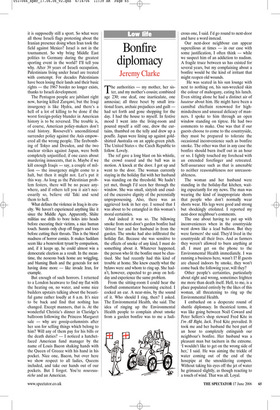Bonfire diplomacy
Jeremy Clarke
The authorities — my mother, her sister, and my mother’s cousin; combined age 230; one deaf, one inarticulate, one amnesiac; all three beset by small irrational fears, archaic prejudices and guilt had set forth and gone shopping for the day. I had the house to myself. In festive mood I went into the living-room and poured myself a stiff one, drew the curtains, thumbed on the telly and drew up a pouffe. Japan were lining up against goldshirted Australia on an apple-green pitch. The United States v. the Czech Republic to follow. Lovely.
The ref gave a long blast on his whistle, the crowd roared and the ball was in motion. A knock at the door. I got up and went to the door. The woman currently staying in the holiday flat with her husband was standing on the threshold. We hadn’t yet met, though I’d seen her through the window. She was small, sixtyish and exuded the excessive dignity of the perennially unprepossessing. Also, there was an aggrieved look in her eye. I sensed that I was about to be entangled in this woman’s moral certainties.
And indeed it was so. The billowing smoke from next-door’s garden bonfire had ‘driven’ her and her husband in from the garden. The smoke had also infiltrated the holiday flat. Because she was sensitive to the effects of smoke of any kind, I must do something about it. Whatever happened, the person who lit the bonfire must be chastised. She had recently had this kind of trouble at home. She knew exactly what the bylaws were and whom to ring up. She hadn’t, however, expected to go away on holiday and experience the same problem.
From the sitting-room I could hear the football commentator becoming excited. I cocked an ear. A near-miss, by the sound of it. Who should I ring, then? I asked. The Environmental Health, she said. The idea of ringing up the Environmental Health people to complain about smoke from a garden bonfire was to me a ludi crous one, I said. I’d go round to next-door and have a word instead.
Our next-door neighbour can appear supercilious at times — in our case with some justification, I often think — while we suspect him of an addiction to nudism. A fragile truce between us has existed for several years, but my complaining about a bonfire would be the kind of irritant that might reopen old wounds.
He was seated in his sun lounge with next to nothing on, his sun-wrecked skin the colour of mahogany, eating his lunch. Even sitting alone he had a distinct air of hauteur about him. He might have been a cannibal chieftain renowned for highmindedness and unusual delicacy of manners. I spoke to him through an open window standing on tiptoe. He had two comments to make. One was that if our guests choose to come to the countryside, they must be prepared to tolerate the occasional inconvenience such as bonfire smoke. The other was that in any case the bonfire should burn itself out in an hour or so. I lightly touched my forehead with an extended forefinger and retreated. Self-assurance such as that is amenable to neither reasonableness nor unreasonableness.
The woman and her husband were standing in the holiday-flat kitchen, waiting expectantly for my news. The man was wearing the kind of inappropriate shorts that people who don’t normally wear shorts wear. His legs were good and strong but shockingly etiolated. I reported my next-door neighbour’s comments.
The one about having to put up with inconveniences when in the countryside went down like a lead balloon. But they were farmers! she said. They’d lived in the countryside all their lives. And as farmers they weren’t allowed to burn anything at all. I must get on the phone to the Environmental Health immediately. I was running a business here, wasn’t I? If guests are chased indoors by smoke, they won’t come back the following year, will they?
Other people’s certainties, particularly about right and wrong, sometimes frighten me more than death itself. Hell, to me, is a place populated entirely by the likes of this woman, all threatening to ring up the Environmental Health.
I embarked on a desperate round of shuttle diplomacy. In theatrical terms, it was like going between Noël Coward and Peter Sellers’s shop steward Fred Kite in I’m All Right, Jack. Fred Kite prevailed. It took me and her husband the best part of an hour to completely extinguish our neighbour’s bonfire. Her husband was a pleasant man but taciturn in the extreme. ‘I wouldn’t like to get on the wrong side of her,’ I said. He was aiming the trickle of water coming out of the end of the hosepipe at the smouldering compost. Without taking his eyes off the jet of water he grimaced slightly, as though reacting to a touch of wind. That was all. Loyal.


















































































 Previous page
Previous page